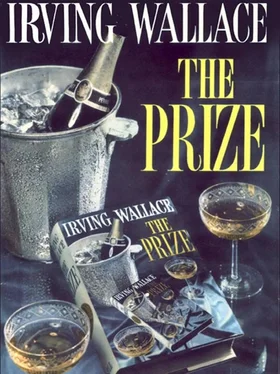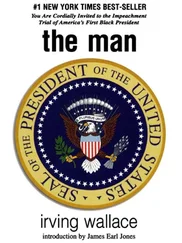Someone in the middle row raised his hand and began to ask another question, but Stratman held up his pipe for further attention. He was not through, and again he addressed himself to the busily writing Aftonbladet journalist.
‘I might add-in honesty, I might add one more point,’ said Stratman. ‘You made mention of the neglect of Thomas Alva Edison by the Nobel Committee. Strictly speaking, Herr Edison was not a physicist, not a chemist, not a physician. He was entirely the inventor. I do not know, but possibly this made him ineligible for a Nobel Prize. I want to say, I think he was one of the most remarkable scientists that the world ever produced. He took out over one thousand patents-he invented the phonograph, the electric lamp, the mimeograph, the alkaline storage battery, the kinetograph-but he conceived only one scientific discovery as such, the Edison effect, so vital to radio and television. Perhaps I am, as my colleagues call it, sticking my neck out to speak further, but at my age, such things do not matter. It is my opinion that between 1901 and 1931 Herr Edison should have received a Nobel Prize in physics. This is not an adverse commentary on the judges of those days. Their task was not an easy one. Indeed, they had to give themselves limitations. Omissions are understandable to me. I only make an opinion, with the comfort of hindsight. Herr Edison should have won the prize.
‘Also, while we speak of these matters, I believe Herr Wilbur Wright, who lived until 1912, and Herr Orville Wright, who lived until-think, yes, 1948-both alive during the time of the Nobel Prizes-should have been honoured in physics for developing the first practicable aircraft. Now, my neck is far out, but you see I favour the inventions in physics as much as the discoveries. I think the Swedish Academy of Science does, too-or why would I be here?-and that their sins of omission have been admirably few. The only overall omission I would criticize is the pitifully few prizes given to pure theorists-let us say like Herr Einstein and Herr Bohr and Herr Schrödinger. Experimentalists-discoverers, inventors-are too frequently honoured. They are important, very important, but most discoveries utilize and verify either Einstein’s theory of relativity or the old conversion of momentum theories. At the same time, the abstract theorists, the elite of physics, are too frequently overlooked. To my mind, that is the major defect in Soviet science today. The Russians devote so much effort and money to satellites, nuclear weapons, rockets, that they neglect basic research and abstract theory, and one day, they will suffer for it.’
Stratman raised his head, seeking the Aftonbladet journalist, and said, ‘I hope that answers your questions’. His eyes swept the hall. ‘You see what happens when you ask me provocative questions? You will be here all the day and tonight. Now, I am ready for more, if you are.’
The reporter from the Stockholm Dagens Nyheter was standing, and Stratman acknowledged him by adjusting his bifocals and nodding.
‘Herr Professor,’ the reporter began, ‘so far we have been discussing discoveries and inventions in general, and of the past, and I should like to bring the interview to a specific point and to the present-’
‘ Jawohl ,’ Stratman agreed.
‘You have been awarded the Nobel Prize in physics for the “discovery and invention of a photochemical conversion and storage system for solar energy” and for the “practical application of solar energy to produce synthesized solid rocket propellants”. Except for reading, everywhere, that you have harnessed the rays of the sun, found a way to stock it and transport it, and proved that this kind of energy can help turn out rocket fuels, making obsolete the energy derived from coal and other fossil sources, I nowhere have read or been able to learn precisely what you have done.’
There was appreciative laughter in the room, and even Stratman responded with an understanding smile.
The Dagens Nyheter reporter earnestly continued. ‘I am not alone in wanting to know your process, your instrument or container, the means exactly for which you are being honoured. I have asked the Royal Swedish Academy of Science, and they cannot-or will not-tell me. Will you?’
Stratman peered impishly over his bifocals. ‘They cannot tell you, because they do not know- exactly .’
‘Herr Professor, I have no intention of being disrespectful-but how could they honour you for an invention about which they know so little?’
‘Because, I am told, your Swedish investigators came to the United States and learned from my government and my colleagues what I had done. They were shown proof of what I have done. They were shown results at our fuel plant in the Mojave Desert. But, for reasons of national security, they could not be shown the means, the process, the storage system.’
A woman from United Press International called out, ‘Professor Stratman, can you give us any detail of your actual discovery?’
He shook his head. ‘No. I am sorry, no.’
‘Not so much as a hint? Something to write about?’
‘Not even so much. I apologize deeply. It is highly classified military information.’
The Neues Deutschland man, who was from East Berlin, spoke up. ‘I am surprised they let you out of the country.’
Stratman smiled. ‘Because they saw I was an old man who needed a holiday. Besides, they agreed that I was an absent-minded professor who would never remember the formula, anyway.’ Suddenly, he was serious. ‘It is an unhappy state of the world, to have this censorship, I agree. It is not an exclusive symptom of my adopted homeland. Secrecy, in certain circles, is a way of life, an attitude towards survival, in your Sweden, your England, your Russia, too, I assure you. No longer can the scientist think of himself as a citizen of the world. The frontiers of his mind, once boundless, are now constricted by nationalist barriers. The fraternity of the past, exchanging ideas and findings, co-operating, is no more, to the detriment of humanity. But that is the fact of the situation. When there is a common effort to halt competition and erase fear from all minds, the international fraternity of science will meet and come to order again. Then, all men and all nations will profit. It is the day I hope to see, still in my lifetime.’
There was a spattering of applause among the reporters, and someone shouted, ‘Hear, hear,’ and Stratman seemed surprised and pleased.
‘Herr Professor,’ said the reporter from Svenska Dagbladet , ‘if you cannot give away the secrets of your invention, maybe you can tell us something useful in a general way. Why did you interest yourself in solar energy? What is the value in harnessing the sun’s rays?’
The press waited, as Stratman weighed his reply. At last, his dome of a head bobbed in the affirmative. ‘ Ja , the questions are fair. It would be wrong to send you back to your editors empty-handed. So-the questions. I will try to avoid the lecture room, but speak in such a way that you will understand, at least, what the motive behind my work was, and what it has accomplished.’ He pointed his meerschaum towards the windows. ‘Out there is the sun. It is ninety-three million miles away, yet sun’s outer atmosphere engulfs our earth, and its rays of atomic energy-hydrogen atoms converted into helium atoms-dominate our daily lives. What kind of potential energy, in earth terms, does this sun offer our tiny planet? If our entire earth were covered with an ice layer four hundred and twenty-five feet thick, and if it could be melted-which it could not-the sun’s rays would melt all of it, every inch of it, in twelve months. It would take twenty-one billion tons of coal to match the solar energy that covers the earth every sixty minutes. In the Sahara Desert alone, the solar energy imparted in one day-one single day-is three times as much as all the coal used in the world in three hundred and sixty-six days. In any two days of the year, sunshine offers more energy than may be found in all the coals and other fossil fuels yet untouched beneath the earth’s crust. Potential power fantastic- ja -but how to enslave it?’
Читать дальше












